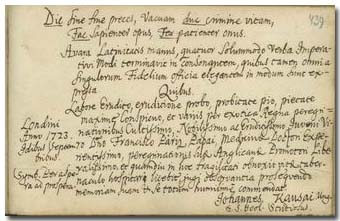
Dic sine fine preces, vacuam duc crimine vitam,
Fac sapienter opus, Fer patienter onus.
Avara Latinitatis manus, quatuor solummodo verba imperativi modi
terminavit in consonantem, quibus tamen omnia singulorum fidelium
officia elegantem in modum sunt expressa.
Quibus
Labore erudito, eruditione probo, probitate pio, pietate maxime
conspicuo, et variis per exotica Regna peregrinationibus
Cultissimo, Nobilissimo ac Eruditissimo Juveni Viro D[omi]no
Francisco Páriz Papai, Medicinae Doctori Experientissimo,
peregrinationis suae Anglicanae Promotori Liberalissimo, et
quamdiu in hoc fragilitati obnoxio vitae tabernaculo hospitare
licebit, jugi observantia prosequendo memoriam suam & se totum
humilimè commendatur.
Johannes Kausai. Ung[arus]

Londini Anno 1723 Idibus Septembribus
Symb. Per aspera ad prospera. |
|
Tell your prayers without end, lead your life
without sin, / do your things wisely, carry your
burden with patience.The covetous
hand of Latins closed the imperative of only four verbs with a
consonant; but with these four all the duties of every believer
can be expressed.
With which
I will faithfully conserve the memory of,
and humbly recommend mine to the noble and young Ferenc Pápai
Páriz, who is learned by efforts, brave by learnedness, pious by
braveness, outstanding by piety, and very wise, noble and cultured
by the visitation of many foreign lands; to the experienced
physician and my generous promoter during my peregrination in
England; as long as I may stay in this tabernacle of my life
subdued to transitoriness,
János Kausai, Hungarian
student of theology
In London, on the Idus of September of 1723.
Motto: Through difficulties to felicity.
|
p.
439. London, September 13, 1723
Kausai, János
(active 1723-1724), Hungarian
student of theology
János Kausai wrote in the album of Pápai Páriz on
September 13, 1723, indicating his being Hungarian and a student
of theology (Ung., S. S. Theol. Studiosus). He immatriculated in
the rolls of the university of Utrecht in 1724 as “Johannes Causai,
Kecskemethino-Hungarus.” From this we learn him to come from
Kecskemét. We have no more data about him.
•
AlbUtr 125 • Weszprémi III 314 |